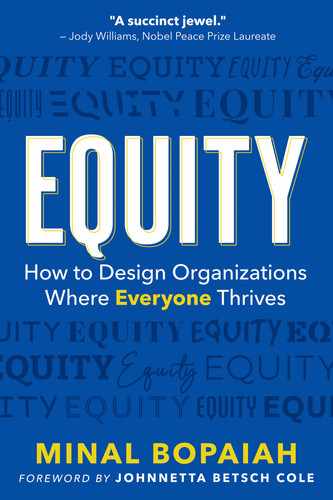Foreword
Violent acts of systemic racism, sexism, heterosexism, and other forms of inequity are certainly not new in our country or in the world. And yet the recent killings of George Floyd, Breonna Taylor, Tony McDade, Nina Pop, and so many other Black people have led to far more awareness of inequities and a growing interest in addressing these injustices. It is almost prescient that Minal Bopaiah has written a book that addresses systemic inequity, and it should be read widely by individuals in diverse organizations who share an interest in, and hopefully have a commitment to, transforming their workplaces so that everyone can thrive.
This book is about very serious and complex attitudes and behaviors. Minal addresses how implicit bias influences how we design our systems, organizations, and even our culture; how we can use human-centered design to invite behavior change; and how to draw on principles of behavior change communications to effectively communicate inclusion, diversity, equity, and accessibility and thereby reduce resistance and sabotage in organizations. And she dares to compel leaders to make it their business to uphold democracy in service of creating a more equitable world. And yet this book is an easy read because Minal is a gifted writer and an engaging storyteller who draws on just the right amount of authoritative research, engaging examples, and personal experiences.
Minal clearly appreciates the power of brevity and of wit. This book, though slim in the number of its pages, is full of critical ideas, practical and doable steps for designing and creating meaningful change, and inspiring passages that have the possibility to incentivize anyone who reads them to create more equity and justice. And should we do so in ways small or grand, as this book promises, we will know the depths of our true humanity.
This is an ambitious promise, but I expect no less from Minal, who claims me as her mentor, a role I willingly and proudly play. As an African proverb says, “She who teaches must learn and she who learns must teach.” A healthy, meaningful, and satisfying relationship always involves reciprocity. And so, over the years that Minal and I have known and worked with each other, we continue to learn from and teach each other about the similarities and differences in being cisgender Brown and Black women of very different ages, trained in different academic disciplines, but equally committed to social justice as we carry out our respective work to help organizations create more inclusive, diverse, equitable, and accessible workplaces.
In the interest of full disclosure, I must share that in addition to our mentor-mentee relationship, Minal and I have grown to refer to each other in familial terms—I am her Auntie J, and she is my Niecey. These forms of address reflect the reality that kinship is about more than lines of descent and marital relationships. Kinship is also about shared values, beliefs, and yes, shared hopes and dreams. Therefore, I cannot claim detachment in recommending her book. Rather, I claim lineage, for it is clear, despite our differences in both life and how we approach our work, we see the world through the same lens. And that world can be made beautiful through the virtue and practice of equity.
– Johnnetta Betsch Cole, PhD
President and Board Chair, National Council of Negro Women President Emerita, Spelman and Bennett Colleges
